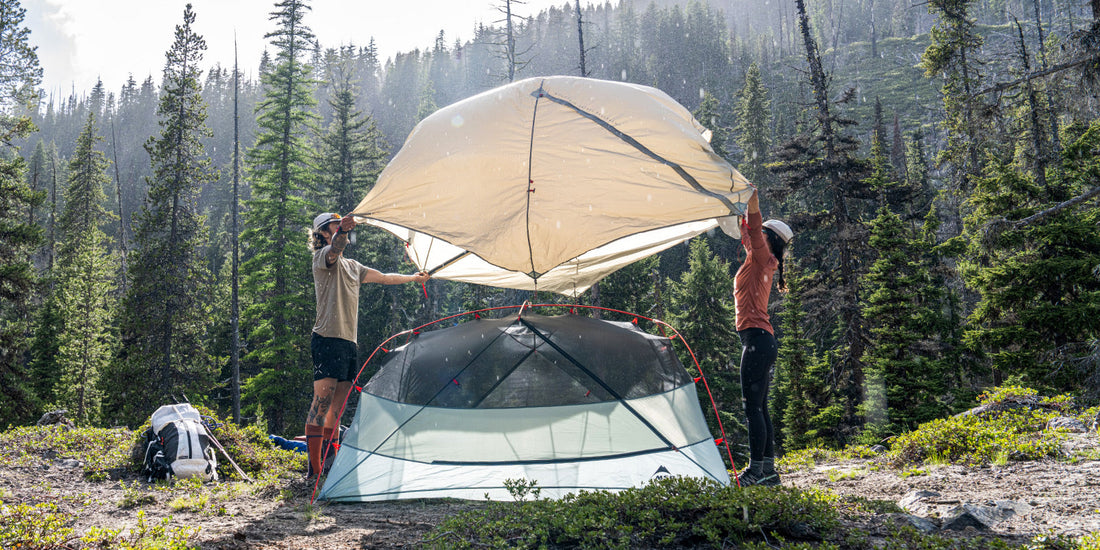
Tent Care Tips: How to Make Your Tent Last Longer
MSR TeamWhether the backcountry beckons to you every weekend or an annual camping trip with friends and family is more your pace, ensure your tent stands up for the long haul by taking proper care of it. Here are six simple tent care tips for making your tent last longer.
1. Never store your tent wet

Storing your tent while it’s wet or even damp can lead to the premature breakdown of its fabric and coatings. For this reason, the number one guideline for longer tent life is to make sure your tent is clean, dry and stored in a temperature and humidity-controlled area. After every trip, spread your tent out over a clothesline and let it dry for a day. Even if it didn't rain, tent floors get wet from dew and your body puts out a lot of moisture that can make fabrics imperceptibly damp. Once dry, store your tent in a loose, breathable mesh sack, not it's stuff sack. This will help reduce the chance of trapping moisture in your tent and it's just easier on the zippers and fabrics to be stored loosely.
2. Treat your poles well

Most pole damage occurs during setup. Try to keep the ends of the pole sections from banging together when assembling the frame as it can dent them or create cracks at the ends, which can compromise pole strength and lead to breakage. Also, make sure pole segments are fully inserted into one another before bending them. Bending poles that are not fully assembled puts a lot of force on the walls of the pole and is one of the most common causes of deformed and broken poles.

When disassembling your poles, start from the center and move outwards to evenly distribute the tension on the shock cord. If you’ve been in dusty or salty conditions, make sure to rinse your poles with fresh water, especially around the intersections, and allow them to dry fully before storing. (Note that shock cord does eventually dry out, just like an old rubber band. Replacement is pretty easy though and we've got a video how to do it here.)
3. Use a footprint with your tent

Footprints are designed to keep your tent floor clean, dry and protected from excessive abrasion. By keeping water and dirt away from the bottom of your tent, a footprint also helps your tent stay clean when you need to pack it up again.
4. Be kind to the zippers

The best thing you can do to extend the life of the zipper is to go slow and use two hands when zipping your tent open or closed. Tent fabric is designed to be taut when set up, so there will always be some tension on the zipper. Assisting the zipper with a second hand, especially when going around a curve, will reduce wear on the zipper and its metal slider and help keep it running smoothly. Keep zippers clean and free of fine grit, which can wear away at the zipper’s metal slider to the point where it no longer clinches the zipper teeth together. An old toothbrush is great for this.
If zippers seems sticky, apply a wax zipper lubricant. Gear Aid sells just such a product, and you can even just rub wax (candle wax, ski wax, etc.) along the zipper, running the slider over it to help get good coverage. Steer clear of sticky waxes, like lip balms. They will only attract more dirt and are hard to remove.
5. (Re)seal the seams

Over time, moisture, heat and humidity can break down the seam tape and sealant on tents made of lightweight fabrics. If you start to notice leaks along your seams, seam sealing can make them waterproof again.
6. Avoid long-term UV exposure
Tents can offer great protection in sunny as well as stormy weather. However, you shouldn’t set up your tent in your backyard and forget about it, leaving it to bake in the sun. UV rays break down nylon fiber, making it dry and brittle, reducing its tensile strength. When this happens, the fabric can rip at the seams and stress joints. Polyester offers a little more UV resistance over nylon fabrics, but any tent should be stored out of direct sunlight when not in use. If you take good care of your tent, it will take good care of you, so you can have adventures together for many years to come.
Related Posts:
Updated. Originally Published November 10, 2017.



